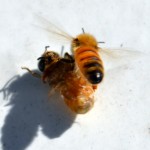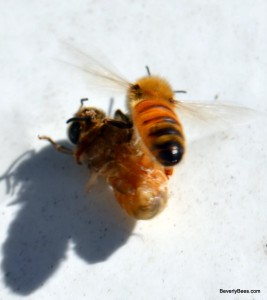
Bring Out Yer Dead – The Undertaker Bees
One of the most fascinating aspects of beekeeping is watching the numerous activities of the colony. Every bee has a specific job, without which the hive as a whole could not exist. There are bees that build wax; nurse bees to take care of the babies; field bees to collect water, propolis, pollen and nectar; bees to make honey; guard bees to protect the hive; and undertaker bees who clean the hive of carcasses.
The undertaker bees are incredible to watch as these bees work very hard to carry out all the dead and dying bees from the hive. Sometimes they fly them easily 20 or more feet away from the hive and drop them to the ground. Other times they haul out bees that are bigger and heavier than they can lift into the air. I have seen undertaker bees struggling for 15 or more minutes to fly with these bees, reposition them several times to try to get a better grip, only to fly a few inches, fall to the ground and painstakingly drag them all the way off of my roof. If you look in the gutters around my rooftop hives, you will see hundreds of dead bees deposited there over time by the undertaker bees. My gutters have become the defacto bee cemetery.
An undertaker bee struggling to cart away a drone bee. She is attempting to fly but can’t get off the ground and is dragging the bee instead.
Sometimes the bees they lug out are still alive. These dying bees do not put up a fight, they let the undertaker bees take them away to die. I can’t help but think of Monty Python and the Holy Grail [Blu-ray] when ever I see the undertaker bees at work, especially when they cart out the bees that are not dead yet.
when ever I see the undertaker bees at work, especially when they cart out the bees that are not dead yet.
BEAUTIFUL















No comments:
Post a Comment